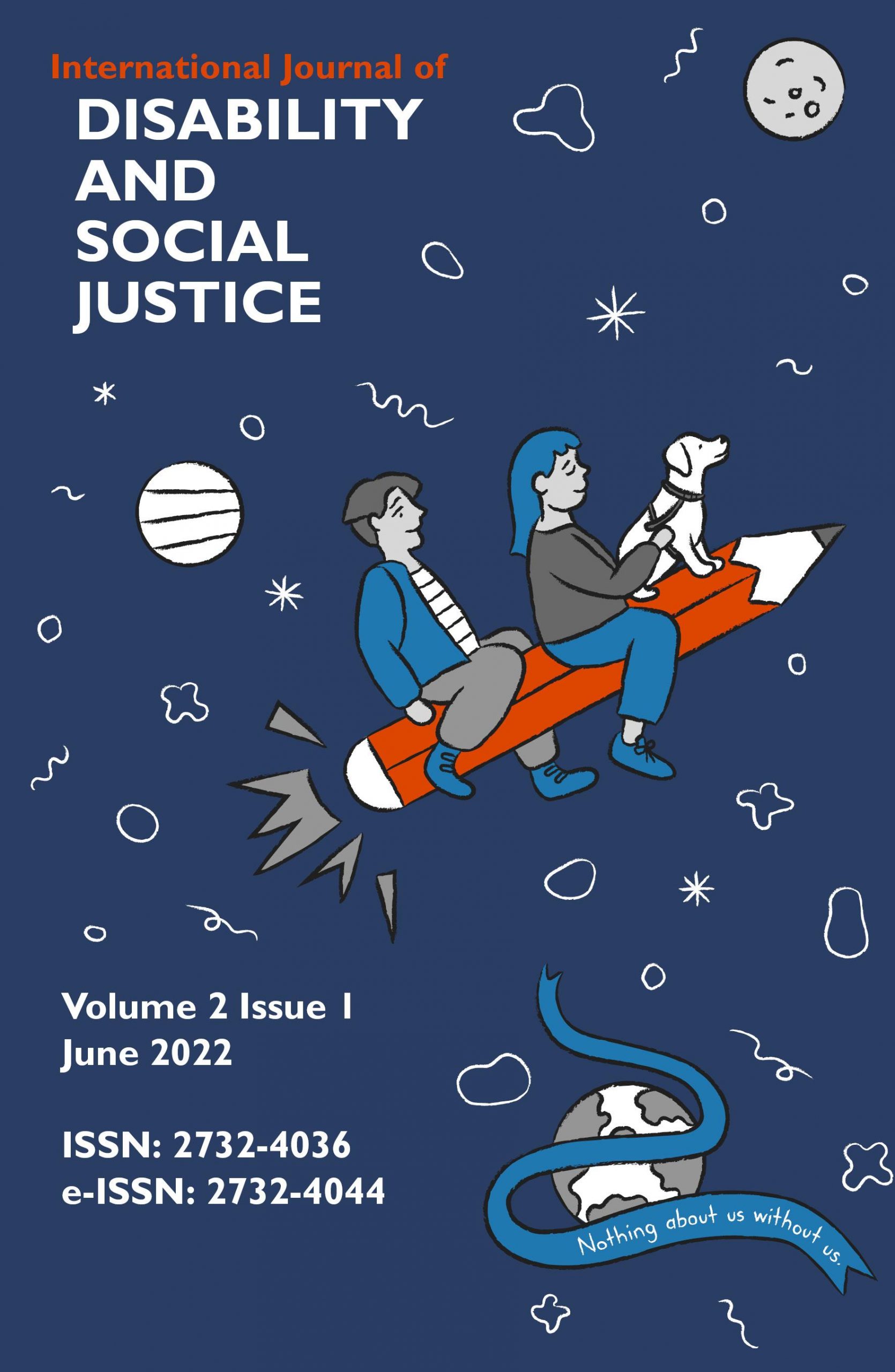
International Journal of Disability and Social Justice
Disabled people make up roughly a fifth of the world’s population. As people with different forms of ascribed impairment or functional limitation, they continue to experience exclusion and disadvantage in all parts of the world because of ableism and an array of disabling attitudes, systems, structures and practices. Read the research published in the Journal to find out about these processes of disablement. The Journal always aims to critique, re-imagine and develop new approaches to social justice for disabled people. We are concerned with critiquing injustice and finding ways to build inclusive environments, technologies and societies.
Print ISSN: 2732-4036
Online ISSN: 2732-4044
The International Journal of Disability and Social Justice (IJDSJ) is a new international and interdisciplinary journal in the field of Disability Studies, providing an outlet for scholars and academic-activists.
Launching in 2021, the Journal will be of interest and use to the broader community of disabled people and their allies, who are working to challenge injustices and build inclusive societies.
IJDSJ understands Disability Studies to include Critical Disability Studies, Ability Studies and Studies in Ableism. The Journal recognises the connections between Disability Studies and allied fields including Deaf Studies, Mad Studies and Critical Autism Studies. Authors from these fields are warmly invited to submit to and engage with the Journal.
Given the Journal’s focus on social justice, many contributions will draw upon ideas developed in the broad fields of:
- Socio-Legal Studies and Human Rights
- Critical Sociologies
- Political Science
- Social and Public Policy
- Philosophy/Ethics/Theology
- Radical/Critical Social Work, Health and Psy- Sciences
- Inclusive Education
- Critical Management/Business Studies
- Inclusive Design
Founding Editor-in-Chief and Chair of Editorial Executive
- Angharad E. Beckett (University of Leeds, UK)
Editorial Assistant
- Christian J. Harrison (University of Leeds, UK)
Executive Editors
- David Abbott (University of Bristol, UK)
- Beverley Clough (Manchester Metropolitan University)
- Frederic Fovet (Thompson Rivers University, Canada)
- Miro Griffiths (University of Leeds, UK)
- Chrissie Rogers (University of Kent, UK)
- Simon T.M. Ng *Reviews Editor* (Hong Kong Academy for Performing Arts, Hong Kong)
International Advisors
- Peter Blanck (Burton Blatt Institute, Syracuse University)
- Theresia Degener (Evangelische Hochschule Rheinland-Westfalen-Lippe, Germany)
- Arlene Kanter (Syracuse University)
- Gerard Quinn (UN Special Rapporteur on the Rights of Persons with Disabilities)
- Karen Soldatic (Western Sydney University)
- Michael Ashley Stein (Harvard Law School Project on Disability, Harvard University, USA)
Editorial Board
- Nazmi Abdel-Salam Al-Masri (Islamic University of Gaza, Palestine)
- Steven Allen (Validity Foundation, Hungary)
- Shilpaa Anand (BITS Pilani Hyderabad Campus, India)
- Anna Arnstein-Kerslake (Universities of Galway and Melbourne, Ireland and Australia)
- Julia Bahner (Lund University, Sweden)
- Maria Berghs (De Montfort University, England)
- Leah Burch (Liverpool Hope University, England)
- Dikmen Bezmez (Koç University, Türkiye)
- Nicola Burns (University of Glasgow, Scotland)
- Bronagh Byrne (Queens University Belfast, Northern Ireland)
- Tom Campbell (University of Leeds, England)
- Paula Campos Pinto (University of Lisbon, Portugal)
- Heng-hao Chang (National Taipei University, Taiwan)
- Edmund Coleman-Fountain (Northumbria University, England)
- Pedro Encarnação (Católica Lisbon School of Business and Economics, Portugal)
- Deborah Fenney (Kings Fund, UK)
- Janos Fiala-Butora (University of Galway, Ireland)
- Debbie Foster (Cardiff University, Wales)
- Piers Gooding (La Trobe Law School, Australia)
- Dan Goodley (University of Sheffield, England)
- Robert Gould (University of Illinois Chicago, USA)
- Shaun Grech (Critical Institute, University of Cape Town and CBM, Malta and South Africa)
- Rune Halvorsen (Oslo Metropolitan University, Norway)
- Rosie Harding (University of Birmingham, England)
- Paul Harpur (University of Queensland, Australia)
- Katharina Heyer (University of Hawaii, USA)
- Raymond Holt (University of Leeds, England)
- David Howe (Western University, Canada)
- Harvey Humphrey (University of Glasgow, Scotland)
- Esther Ignagni (Ryerson University, Canada)
- Laverne Jacobs (University of Windsor, Canada)
- Sanjay Jain (ILS Law College, Pune, India)
- Kelley Johnson (University of New South Wales, Australia)
- Emily Kakoullis (Cardiff University, Wales)
- Hisayo Katsui (Helsinki University, Finland)
- Anna Lawson (University of Leeds, UK)
- Rebecca Lawthom (University of Sheffield, England)
- Oliver Lewis (Doughty Street Chambers, England)
- Kirsty Liddiard (University of Sheffield, England)
- Ravi Malhotra (University of Ottawa, Canada)
- Janice McLaughlin (Newcastle University, England)
- David T. Mitchell (The George Washington University, USA)
- Teodor Mladenov (Dundee University, Scotland)
- Hannah Morgan (University of Leeds, England)
- Belaynesh Tefera Nidaw (Addis Ababa University, Ethiopia)
- Charles O’Mahoney (University of Galway, Ireland)
- Nagase Osamu (Ritsumeikan University, Japan)
- Shivaun Quinlivan (NUI Galway, Ireland)
- Sana Rizvi (Liverpool John Moores University, England)
- Eric Rosenthal (Disability Rights International, USA)
- Katherine Runswick-Cole (University of Sheffield, England)
- Jonas Ruškus (Vytautas Magnus University, Lithuania)
- Sara Ryan (Manchester Metropolitan University, England)
- Precious Nonye Sango (University of Bedfordshire, UK and International School of Disability Studies, Nigeria)
- Lucy Series (Cardiff University, Wales)
- Maha Shuayb (University of Cambridge and Lebanese American University, UK and Lebanon)
- Roger Slee (University of Leeds, England)
- Simoni Symeonidou (University of Cyprus, Cyprus)
- Filippo Trevisan (American University in Washington, DC, USA)
- Maria Pia Venturiello (University of Buenos Aires, Argentina)
- Lisa Waddington (Maastricht University, Netherlands)
- Jörg Weber (CBM, Critical Institute and University of Cape Town, South Africa)
- Felix Welti (University of Kassel, Germany)
- Shirli Werner (Hebrew University of Jerusalem, Israel)
- Gregor Wolbring (University of Calgary, Canada)
- Kuansong Victor Zhuang (Princeton University, USA and Nanyang Technical University, Singapore)
Reviews Sub Editors
- Andrew David King (University of California, Berkeley, USA)
- Burgandi Rakoska (University of Leeds, England)
- Amy Redhead (University of Leeds, England)
We ask authors to please read our Journal Ethics Statement and Guidance for Authors documents (under DOWNLOADS below) when preparing their manuscripts and before submitting to the journal. The Guidance for Authors also includes information on journal style.
Both documents have been written by the Journal’s Executive Committee, assisted by and in consultation with the Journal’s Editorial Board.
Authors may also wish to read the template Permissions Form, supplied by Pluto Journals (under DOWNLOADS below). When an article is accepted for IJDSJ, authors will be required to sign this form prior to publication. It explains their rights.
IJDSJ will strive to make decisions on submissions within 4 months, but should there be delays, authors will be kept informed.
How to submit
Submissions should be sent to the I.J.D.S.J. Executive Editors via email: IJDSJContact@gmail.com
Please make sure you:
1. Write ‘Submission’ in the email subject heading
2. Include all relevant attachments to your email
You will receive an auto-reply to acknowledge receipt of your email. If you do not receive this, then this may mean that your email has not been delivered. Please resend.
The Editorial Executive, IJDSJContact@gmail.com
Publisher Pluto Journals, evek@plutojournals.com
This journal will be published three times a year. The journal has been indexed on DOAJ since March 2023. For the purposes of preservation and restoration the PORTICO archiving system is used to create permanent archives for the journal.
The journal is Open Access and the Open Access statement, Open Access license terms, copyright terms as well as a statement on its absolute lack of author charges can be found here.
The journal became Open Access with its first edition on 1 November 2021 and is published open access on ScienceOpen. The Reuse rights of published material is all under the open CC BY 4.0 license as stated here.
We are committed to maintaining the highest standards of publication ethics and to supporting ethical research practices. We expect authors to reflect on the ethical stance adopted in their papers. This includes, but goes beyond, procedural matters, to questions of values and relationality. Empirical studies should detail appropriate ethical approvals and discuss the ethical implications and/or challenges of their research. We would, where relevant, expect to see discussion about (but not limited to): the process of gaining the consent of research participants; handling difficult and/or sensitive topics; researcher positionality; attempts to maximise diversity and inclusion in sampling and participant recruitment.
We understand that language and terminology vary in different contexts and geographies. However, we expect submissions to be thoughtful about their use of language, culturally sensitive and cognisant of current debates and preferences of relevant groups, for example, in relation to person-first or social model of disability language. Should authors be uncertain in this regard, they are invited to contact the Editorial Executive who will be happy to discuss and offer advice.
We welcome submissions employing a wide range of methodological approaches especially, but not exclusively, those that are coproduced with or led by the people who are the focus of the submission. The full range of quantitative and qualitative methods is of interest to us, including approaches that are, for example, participatory, use creative methods and develop our understanding of methodological innovation. We are also interested in manuscripts which do not draw on any empirical data – including ones that draw on doctrinal legal analysis or engage in theoretical or methodological debate.
We will not accept submissions that undermine the inherent value and integrity of marginalised groups of people. We welcome debate, but not about the inherent worth of, for example, disabled people, people from ethnic groups facing racism and oppression, the trans community and people from across the spectrum of sexual and gender identities. We strive to make this journal an inclusive, open and a safe place for contributors and readers.
We are committed to a peer review process that is respectful and supportive. We also take seriously issues of plagiarism or other forms of fraud and misconduct in academic publishing and research practice. This includes content recycling (what used to be termed self-plagiarism). We will do our best to ensure fair, unbiased, respectful and transparent peer review processes and editorial decisions. Any detected cases of misconduct, whether on the part of authors, reviewers or editors, will be taken very seriously.
Where there is more than one author, it is important that work is fairly acknowledged and that the published author list accurately reflects individual contributions and has been agreed by all authors.
We will work to maximise diversity within our governance structures, including our Executive and Editorial Board and our community of reviewers. We will seek to make content available and accessible to disabled people’s organisations and other readers outside academia interested in disability debates.



